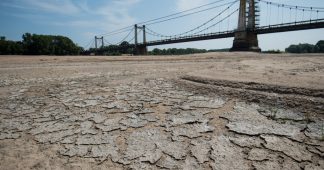“Science and justice demand that we reduce emissions by 70% from 2005 levels by 2030 on the road to zero emissions by mid-century.”
byApr. 21, 2021
The Biden administration is reportedly planning to pledge to cut U.S. greenhouse gas emissions by at least 50% from 2005 levels by the end of this decade, but climate justice advocates say that much more ambitious goals and policies are needed if the U.S. president wants to act in accordance with what the scientific community says is necessary.
Having rejoined the Paris agreement earlier this year, President Joe Biden is expected to formally announce a new domestic emissions reduction target for 2030 during an international climate summit with 40 world leaders hosted by the White House on Thursday.
Representatives from the world’s major economies—including 17 countries that together are responsible for 80% of total global emissions—will meet virtually on Earth Day to discuss plans for limiting the rise in global temperatures to 1.5°C by the end of the century.
Although Biden has not yet officially unveiled a national emissions reduction goal, two unnamed individuals with knowledge of the matter on Tuesday told the Washington Post that the administration is “considering a target range” that could exceed 50% “at the higher end.”
“A pledge to cut emissions 50% by 2030 simply isn’t big enough to meet the massive scale of the climate emergency,” said Jean Su, energy justice director at the Center for Biological Diversity, in response to the reporting. “Solving the climate crisis requires applying both science and equity. On both counts, the U.S.—the largest historic polluter and one of the wealthiest nations—must do its fair share and cut domestic emissions by at least 70% by 2030.”
“Combating the climate emergency at home also requires transforming our economy by moving immediately to end the fossil fuel era and create a renewable and anti-racist energy system that advances justice first,” Su added.
Mitch Jones, policy director at Food & Water Watch, agrees that Biden’s approach to confronting the climate crisis “is not good enough.”
“While these White House goals are being lauded as aggressive, they are inadequate,” Jones said Wednesday in a statement. “As the world’s historical largest emitter of climate pollution, we have a duty to do much more, and to act with greater urgency.”
“These goals—based on comparisons to exceptionally high 2005 emission levels—will be meaningless without policies that explicitly reduce our reliance on fossil fuels,” Jones continued. “Biden can make real headway on that front by fulfilling his campaign pledge to end fossil fuel extraction on public lands. He must also halt all new fossil fuel projects, which are polluting frontline communities and driving up emissions, and should join the push to ban fracking everywhere.”
In a statement, Sunrise Movement political director Evan Weber said that “the science is clear—if the U.S. does not achieve much, much more by the end of this decade, it will be a death sentence for our generation and the billions of people at the frontlines of the climate crisis in the U.S. and abroad.”
Referring to a landmark 2018 report by the Intergovernmental Panel on Climate Change, Weber noted that “in order to have even a 50% shot of staying under 1.5°C of warming to avoid the worst of the climate crisis, we must halve global emissions by 2030.”
“If the U.S.—the country with the most historical responsibility and greatest economic capacity—only halves our own emissions by then, we are doomed,” he added. “We must do much more, as quickly as we can. A new report (pdf) outlines that in order to truly meet our global historic responsibility, we’d have to reduce global emissions by the equivalent of 195% of 2005 U.S. levels.”
Greenpeace also said the Biden administration’s reported plan to limit the country’s emissions reduction goal to 50% by 2030 would be woefully inadequate and inconsistent with what climate scientists say is absolutely necessary.
“To be a true climate leader, Biden has to show his commitment to addressing today’s interlocking public health, racial inequity, and climate crises,” said Janet Redman, climate campaign director for Greenpeace USA. “That means slashing U.S. carbon pollution by beginning the transition away from fossil fuels now, while ensuring no worker or community is left behind.”
“Science and justice demand that we reduce emissions by 70% from 2005 levels by 2030 on the road to zero emissions by mid-century,” she explained in a Wednesday statement. “The White House can get this done by removing government subsidies to fossil fuel companies, investing in an equitable and sustainable economic recovery, and stopping fishy carbon offset deals like the one Biden is considering with Brazil right now.”
Stressing the importance of stopping deforestation and restoring biodiverse ecosystems in addition to quickly phasing out fossil fuels, Greenpeace International’s executive director Jennifer Morgan said that “our survival depends on real climate action—voluntary net-zero targets and offsets are just delaying tactics.”
Agnes Hall, global campaigns director at 350.org, said “there can be no meaningful climate action if world leaders don’t make a decisive move to keep all fossil fuels in the ground,” and that necessitates bold leadership from the U.S. president that goes “beyond promises” and includes concrete actions to put a halt to polluting projects, end subsidies for climate-destroying industries, and urgently fund the renewable energy transition.
“The Biden Summit is a critical meeting of world leaders ahead of COP26 this November,” Hall said Wednesday. “Talk of ‘net-zero’ won’t cut it: we demand more from our world leaders than false promises, false solutions, and empty negotiations.”
“The task now is to hold politicians to their lofty words,” Hall added. “To do that the global climate movement needs to keep up the pressure on our governments at home as well as on the international stage to take urgent action now to reduce carbon emissions and ensure a just recovery by creating a sustainable, fossil-free world.”
Looking ahead to Thursday’s meeting and emphasizing that international cooperation is essential to averting climate catastrophe, Greenpeace’s Morgan said that “history has to be made at Biden’s Earth Day Summit.”
“The world’s richest countries must do more than just halve their emissions by 2030, having profited from extractive and polluting industries leading to the climate crisis,” she added. “It’s time for the wealthiest nations to repair the damage and show solidarity with vulnerable countries.”
Sunrise agreed. Alluding to the Green New Deal resolution—reintroduced this week by Sen. Ed Markey (D-Mass.) and Rep. Alexandria Ocasio-Cortez (D-N.Y.), along with several related bills, including the Civilian Climate Corps for Jobs and Justice Act—Weber implored Biden to deliver “a groundbreaking jobs and infrastructure package to put people to work decarbonizing every sector of our economy, including electricity, transportation, buildings, manufacturing, and agriculture, in the next decade.”
But “this economic mobilization cannot stop at our borders,” Weber added. He called on Biden to direct “international finance to support a just and accelerated transition to renewable energy abroad.”
Published at www.commondreams.org











